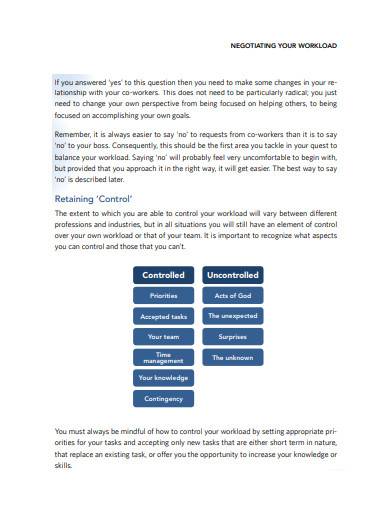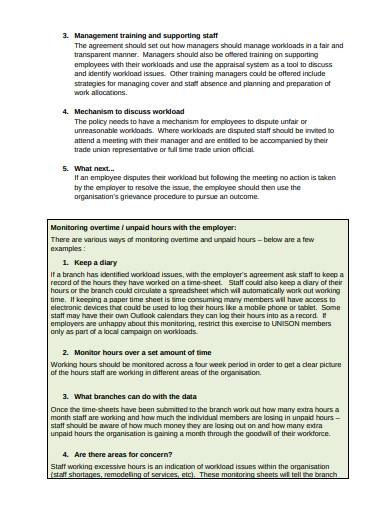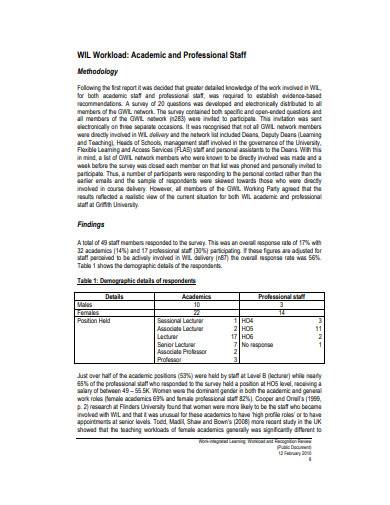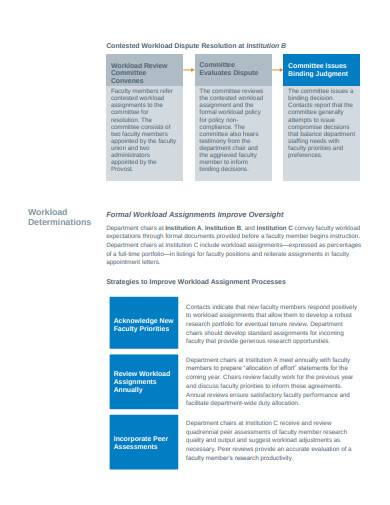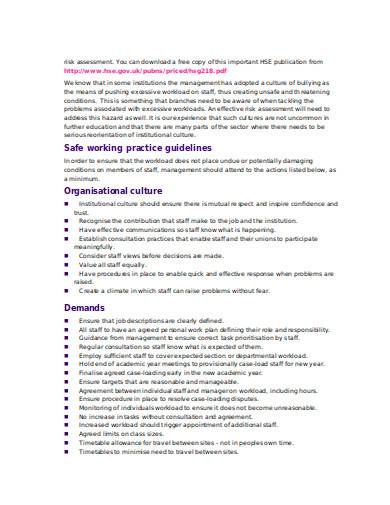The amount of work to be done by an employee is called a workload. A specific workload is often assigned to someone who is capable of doing them or someone who is in the position to do the required work. The task of dividing and assigning a workload is often assigned to a manager or assistant manager. This task is an arduous one, especially when the ratio between work to be done and the people available for work is not proportional. The chances of employees wanting a workload negotiation are high and this is where things get a little rough.
What Do You Mean by Workload Negotiation?
When you think you’re assigned with a workload that is more than what you can handle, then you can write a work overload letter and state your desire to negotiate the workload. It’s our responsibility as employees to work hard because that’s what we’re paid for, but we should be able to differentiate hard work and work overload. If you’re overwhelmed with so much work with impossible deadlines, it’s time you negotiate.
Workload negotiation is done by discussing the matter with your supervisor or manager. A formal letter or email expressing your concern will be a great start to open the issue. Why should you negotiate too much workload? That is so that you can bring the load down to a manageable level to help you function optimally and meet deadlines. Only negotiate your workload if it’s overwhelming and not when it’s your usual workload.
How to Negotiate Workload Limits
Complaining about your workload will not do you any good. It’s just a waste of time and energy. The best and most professional thing you can do is work with your supervisor or manager about the workload limit that you can handle. The following tips will help you.
- You’ll find it easier to negotiate if you have established a reputation as a hard-working employee. Your boss will understand your point for negotiating rather than suspect you of just being lazy.
- As mentioned, complaining about your workload will do you no good and will get nothing done. Your intention for negotiating should be clear and say it in a way that won’t sound demanding.
- Give a good reason why you are negotiating your workload. It could be family commitments or other personal matters that you just can’t compromise.
- Provide a solution or recommendations as part of your negotiation. Talk to your boss about it and don’t just let him work on it alone. Communication allows both of you to share your viewpoint about the subject. Willingness to listen is the key to get things done nicely.
How to Deal with an Extra Workload
Employers conduct a workload analysis before they create sample work plans. This is how they come up with a workload assigned to each employee. More work and few employees mean extra workload for everyone. And there will be times when workload negotiations just can’t be granted. So what should you do? You’ll have to deal with the extra workload. Here’s how.
Step #1: Think outside the box.
If your usual problem-solving style won’t work, then look for other ways to get the job done. Don’t let yourself get stuck on something that won’t help because it will just eat up your time. Find help from people who know the job best or hold a brainstorming meeting or session with your team. Don’t forget to record the meeting minutes for your reference.
Step #2: Set priorities.
Prioritizing tasks never gets old and it always gets the job done. Evaluate which tasks are urgent and do them first. Also, set achievable deadlines so that you’ll know when they’re due. It’s best to use checklist templates or workload templates to make your task more convenient and easy to track.
Step #3: Communicate clearly.
Don’t just send an email about the job. Call a meeting or discuss the changes with your employees face-to-face. If sending emails is your only choice, provide clear and concise instructions and other details on what must be done. You should also be always open to answer job-related questions.
Step #4: Do things one at a time.
If you want to be more productive, you should ditch multitasking and focus on one thing at a time. This way you’ll finish on time and you’ll produce better output.
Step #5: Take a break.
Working too hard can be boring and may prevent you from staying focused. Employers should encourage their employees to take their breaks aside from their lunch break. Breaks allow one’s mind to breathe and prepare for a stream of more information.
4+ Workload Negotiation Samples in PDF | DOC
1. Workload Negotiation Sample
2. Workload Negotiation Template
3. Workload Negotiation Example
4. Workload Negotiation in PDF
5. Workload Negotiation in DOC
Workload negotiation is perhaps one of the most difficult things that you’ll have to deal with at work unless you have really good negotiation skills. Use the samples above to learn more about workload negotiations.
Related Posts
Weekly Schedule Samples & Templates
Contractual Agreement Samples & Templates
FREE 9+ Amazing Sample Church Bulletin Templates in PSD | PDF
Sample Business Card Templates
Sample Cashier Job Descriptions
Questionnaire Samples
FREE 10+ Sample HR Resource Templates in PDF
FREE 10+ HR Consulting Business Plan Samples in MS Word | Google Docs | Pages | PDF
FREE 49+ Sample Job Descriptions in PDF | MS Word
FREE 16+ Nonprofit Budget Samples in PDF | MS Word | Excel | Google Docs | Google Sheets | Numbers | Pages
FREE 13+ Academic Calendar Templates in Google Docs | MS Word | Pages | PDF
FREE 10+ How to Create an Executive Summary Samples in Google Docs | MS Word | Pages | PDF
FREE 23+ Sample Event Calendar Templates in PDF | MS Word | Google Docs | Apple Pages
Company Profile Samples
FREE 10+ Leadership Report Samples [ Development, Training, Camp ]

